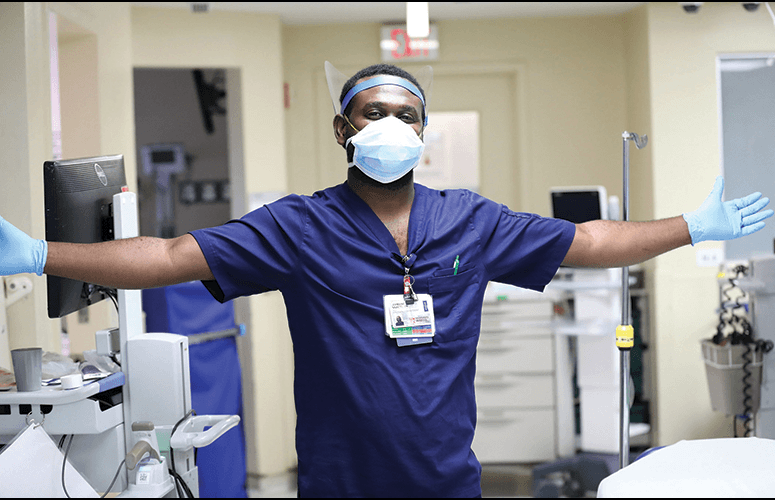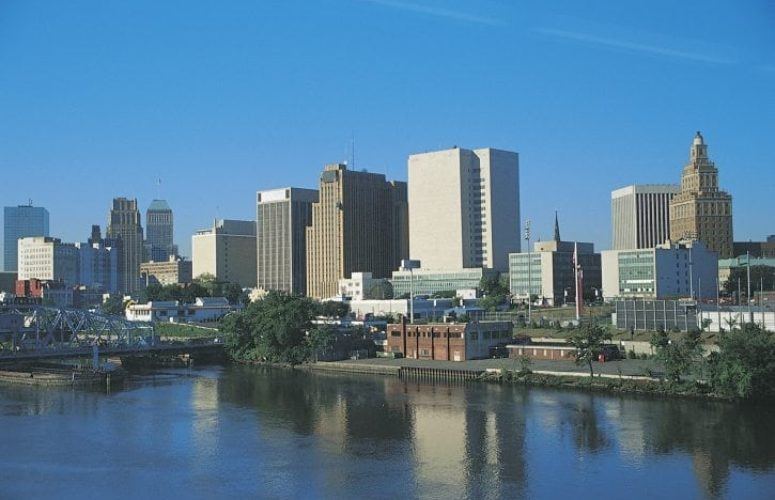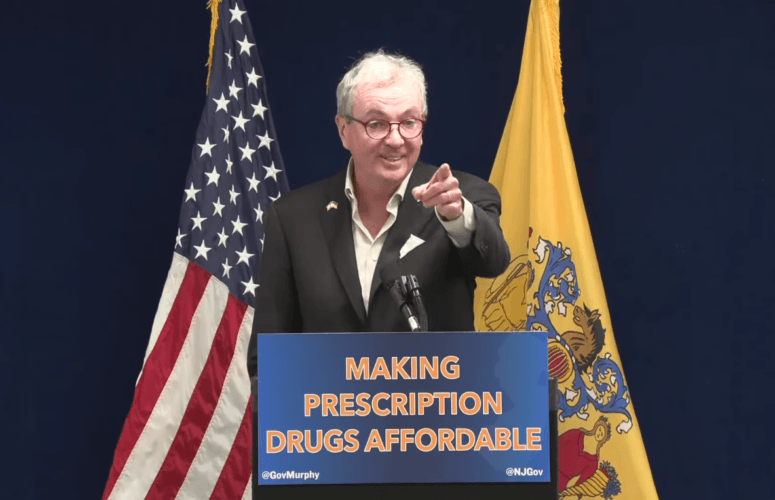
Newark is Strong in the Midst of the Pandemic
City government, businesses and more enact quick, positive changes in the face of COVID-19.
By Anthony Birritteri, Editor-in-Chief On Sep 16, 2020“We are still Newark strong!” That is how Allison Ladd, the city’s deputy mayor and director of economic and housing development, describes the resiliency of Newark businesses and residents in the midst of the COVID-19 pandemic.
In the face of a quarter to a half-year’s worth of lost sales since the state’s shutdown, many Newark businesses are facing hardships, while simultaneously donating food and other supplies to nonprofits such as food banks and making sure their own employees have the personal protective equipment (PPE) they need to operate safely. “That’s the strongest example of resiliency I can think of,” says Bernel Hall, president and CEO of the city’s economic development corporation, Invest Newark.
City Government to the Rescue
Both Ladd and Hall credit Mayor Baraka for acting quickly once COVID-19 cases began to emerge and rise in city.
According to Ladd, the mayor immediately began meeting with his cabinet twice daily in order to coordinate responses. He also made sure health and safety information was shared daily, in real time, with the public via Facebook Live sessions that are reporting between 6,000 to 20,000 viewers, each day.
Ladd says the mayor also realized businesses and residents needed access to capital. To that end, $6 million was collected from a combination of federal funds (via community development block grants), a local trust fund, and private-sector partners to deliver aid under a variety of new initiatives.
Among them was a Small Business Emergency Grant fund in which small retail and home-based businesses were able to receive up to $10,000 in aid. This is in addition to assistance from Invest Newark, which was helping companies apply for New Jersey Economic Development Authority Small Business Assistance Grants, the US Small Business Administration’s Payroll Protection Program (PPP), and a variety of other assistance programs.
Making sure businesses did not spend too much time lumbering over paperwork required for these programs – because time was of the essence in terms of obtaining funds – Invest Newark teamed up with Newark Venture Partners and Audible to offer applicants virtual assistance on how to apply to the various program.
Other Newark-specific initiatives funded via the $6 million included: a Creative Catalyst fund in which $750,000 was allocated for artists and arts organizations; partnering with two Newark hotels to house the homeless; money for nonprofit organizations, many of which offer housing and eviction counseling and workforce development services; and a commercial tax relief program where businesses would realize a cost savings through property tax reassessments.
In what may be the first-of-its-kind initiative in the state or nation, Newark city government, in conjunction with Invest Newark, is requiring businesses to fill out and submit a reopening application – at press-time 1,500 have been handed in – that details a business’s plans for social distancing, PPE, and the use of automation at point-of-sale touch points.
Healthcare Resiliency
Newark and Essex County were in the “eye of the pandemic storm,” as described by Shereef Elnahal, president and CEO of University Hospital and former New Jersey Health Commissioner. “We faced the brunt of the pandemic. It was a trying time for our staff, but we learned so much about emergency preparedness, response and infection control that could be used as best practices not only for other hospitals, but the business community as well,” he says.
At the peak of the crisis, University Hospital was treating more than 300 COVID-19 patients per day, with as many as 10 patients dying each day from the virus.
Additionally, staff members were coming down with COVID-19. “Our nursing staff decreased 33% because people were either getting sick or had family members who were sick. We also had staff members passing away because they contracted COVID-19 in the community, or (at work) because they were putting themselves on the line coming to work every day, exhibiting heroism.”
Luckily, because University Hospital is a Level One Trauma Center and state hospital, medical staff from the US Army Reserve were able to supplement the staffing shortage during the pandemic’s peak.
Now that the volume of COVID-19 patients has lessened, University Hospital is busy getting the word out to Newark residents that it is safe to go to the hospital for regular emergency care and elective surgeries via its “Care Around the Clock” program.
“We started the program when we noticed there was a 50% reduction in people coming in with chest pains, severe abdominal pains and other potential emergencies. Meanwhile, there was a fourfold increase in DOAs (dead on arrivals),” Elnahal says.
The initiative is still needed because “we know that folks’ fears about the coronavirus won’t wane anytime soon. We want to make sure they have confidence in receiving hospital care in a safe environment,” he explains.
The hospital has recently implemented a “Comprehensive COVID-19 Recovery Program” to treat recovered patients who are suffering from the long-term effects of the illness. “We are seeing things like persistent shortness of breath, and the effects of blood clots that may have caused strokes or micro strokes,” Elnahal says. “So knowing that Newark was hard hit, and that folks in the city have more trouble accessing healthcare because they lack commercial insurance, and the fact that a lot of providers do not take Medicaid, we felt it was important to create a specialized program to address these long-effects.”
The Show Must Go On
The New Jersey Performing Arts Center (NJPAC) is keeping residents across the state, country and world entertained during this pandemic via a series of free online offerings that can be accessed on the “NJPAC in Your Living Room” website (www.njpac.org/inyourlivingroom). There, one will find a collection of weekly, curated content of previous performances and educational programing, plus live events. This includes social justice programming on Monday; “Backstage” interviews on Tuesday; contemporary dance classes on “Wellness Wednesdays;” and NJPAC’s traditional “Horizon Sounds of the City,” on Thursdays, featuring professional DJs and guests for a virtual dance party.
NJPAC is also keeping customers engaged via email and social media. “It’s important to maintain a relationship during this shutdown,” says Warren Tranquada, executive vice president and chief operating officer at NJPAC. “All of this is working from a promotions standpoint. I’m sure this will all help when we are back offering traditional performances.”
It has been a challenge operating the center without in-person performances, since 60% of NJPAC’s annual budget relies on ticket sales. Additionally, its busiest and most lucrative time of year has always been the fourth quarter of its performance season – March through June. Luckily, individual and corporate sponsors, whose donations make up 35% of the performing art center’s budget, have been loyal during the crisis.
NJPAC has benefited from a federal Payroll Protection Program (PPP) loan, which has kept full-time staff members engaged through the end of June, Tranquada says. However, employees – who are usually needed during live performances – have been furloughed and others have taken pay cuts.
That said, Tranquada is proud of the NJPAC team during this entire episode. “We are getting better at the online platforms as we go along,” he says. “I am amazed at what staff members have been able to do while they have been experiencing a lot of personal stress. We have been asking them to do more in a time of uncertainty, and they have been delivering.”
Power to the People
The energy is on at Public Service Enterprise Group (PSEG), the power company that is making sure that every home, business and institution in Newark and throughout the state has the electricity and gas they need.
“Whether it’s medical professionals at hospitals, the first responders in our ambulance squads, police and fire departments, or the essential workers who have kept grocery stores, pharmacies and other services going since the start of this health crisis, each requires reliable electric service to do their jobs,” says Ralph Izzo, chairman, president and CEO of PSEG. “Fortunately, our company is made up of talented, committed people who have been able to maintain reliable energy service while still keeping the health and safety of our customers our top priority.”
PSEG employees, including those working for subsidiary Public Service Electric & Gas (PSE&G), have been considered essential workers throughout the pandemic. Crews have been conducting repair and modernization work on electric and gas infrastructure, while more than 400 PSE&G customer service representatives have been working from home, responding to customer needs.
According to Izzo, “Because so many people were expected to work from their homes in Newark and elsewhere, safe and reliable utility service became even more essential to customers. That’s what we think Newark would expect of us.”
Once the pandemic is over, Izzo says there should be no return to “business as usual. We don’t say ‘getting back to normal’ because we want everyone to begin to think creatively and reimagine how we can take the lessons we’ve learned through this pandemic – under conditions we probably would not have undergone willingly, to be perfectly honest – and learn how to apply them to the business going forward.”
Conclusion
As a testament to Newark’s resiliency and continuing revitalization, Deputy Mayor Ladd says economic growth is still occurring in the city. “I was initially concerned that many developers and partners would pull back on their real estate projects because of the pandemic, but that hasn’t happened. We are getting calls from development partners and funders … everyone wants to get to their closings. … This still is an exciting time for Newark,” she says. “We are still Newark strong!”
To access more business news, visit NJB News Now.
Related Articles:





